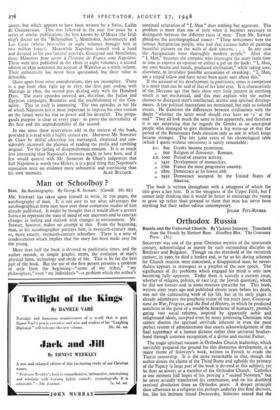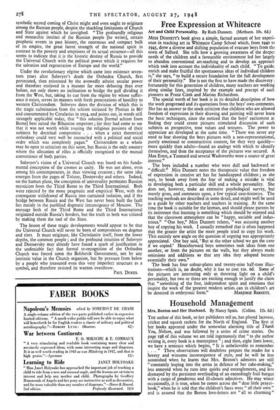Orthodox Russia
SOLOVYEV was one of the great Christian mystics of the nineteenth century, acknowledged as master by such outstanding disciples as Berdyaev and Bulgakov. Though on the threshold of the twentieth century, in 190o, he died a broken and, as far as his daring schemes for Church reunion were concerned, a disappointed man, he never- theless appears in retrospect as a prophet of the new epoch. The significance of the problems which engaged his mind is only now becoming fully apparent. Today there is scarcely a current issue, whether of religion, politics, or race (e.g. the Jewish question), which he did not foresee and in some measure prescribe for. This book, written sixty years ago and published eleven years before his death, was not the culminating work of his life, but in its early pages it already adumbrates the prophetic vision of ten years later, Conversa- tions on War, Progress, and the End of History, in which he predicted antichrist in the guise of a would-be benefactor of humanity, promul- gating vast social reforms, inspired by apparently noble and enlightened ideals, accepted even by many professing Christians who cannot discern the spiritual servitude inherent in even the most perfect system of administration that exacts acknowledgement of the final supremacy of a human dictator rather than universal brother- hood through common recognition of a divine and eternal Father.
The tragic spiritual vacuum in Orthodox Church leadership, which inevitably prepared the ground for this disastrous development, is a major theme of Solovyev's work, written in French to evade the Tsarist censorship., It is the more remarkable in that, though the author denies the claims of the Third Rome and upholds the primacy of the Papacy (a large part of the book is devoted to this subject), yet he does so always as a member of the Orthodox Church. Catholics at one moment lad hopes of his proving a " second Newman,' but he never actual!? transferred his communion, and on his deathbed received absolution from an Orthodox priest. A deeper principle than adherence to a religious rite perhaps underlay this final decision, for, like his intimate friend Dostoevsky, Solovyev sensed that the
symbolic second coining of Christ might and even ought to originate among the Russian people, despite the shackling limitations of Church and State against which he inveighed. " The profoundly religious and monarchic instinct of the Russian people [he writes], certain prophetic events in past history; the enormous and compact bulk of its empire, the great latent strength of the national spirit in contrast to the poverty and emptiness of its actual existence—all this seems to indicate that it is the historic destiny of Russia to provide the Universal Church with the political power which it requires for the salvation and regeneration of Europe and the world."
Under the revolutionary regime which came into existence seven- teen years after Solovyev's death the Orthodox Church, first persecuted, then reinstated by the avowedly atheist secular power and therefore enslaved in a manner far more debasing than ever before, not only shows no inclination to bridge the gulf dividing it from the West, but, taking its cue from the regime by whose suffer- ance it exists, serves its masters with fresh protestations of hostility to western Christendom. Solovyev dates the division of which this is the tragic culmination from the schism initiated by Photius in 867 and consummated by Cerularius in 1054, and points out, in words still strangely applicable today, that " this solution [formal schism from Rome] best suited the Bibantine emperors ; for they had come to see that it was not worth while rousing the religious passions of their subjects by doctrinal compromise . . . when a strict theoretical orthodoxy could very well be reconciled with a political and social order which was completely pagan." Christendom as a whole may be open to criticism on this score, but Russia is the only country where the allocation of roles is officially recognised to the mutual convenience of both parties.
Solovyev's vision of a Universal Church was based on his funda- mental conception of the cosmos as unity. He was not alone, even among his contemporaries, in thus viewing creation ; the same idea emerges from the pages of Tolstoy, Dostoevsky and others. Indeed, on the human plane, the conception of universality permeates Russian mysticism from the Third Rome to the Third International. Both were rejected by the more pragmatic and empirical West, with the consequent withdrawal of Russia into curtained isolation, and if the bridge between Russia and the West has never been built the fault lies mainly in the purblind dogmatic intransigence of Moscow. The message both of the Third Rome and the Third International originated outside Russia's borders, but the truth in both was vitiated by making them the tool of the State.
The lesson of these tragic developments would appear to be that the Universal Church will never be born of compromises on dogmas and rites. It must originate, like Christianity itself, from the lower depths, the common people ; and the profound intuition of Solovyev and Dostoevsky may already have found a spark of justification in the undeniable fact that formal re-recognition of the Orthodox Church was forced upon the Bolshevik Government, not by any intrinsic value in the Church organism, but by pressure from below by a people who treasured even this very imperfect structure as a symbol, and therefore resisted its wanton overthrow.
PAUL DUKES.



































 Previous page
Previous page